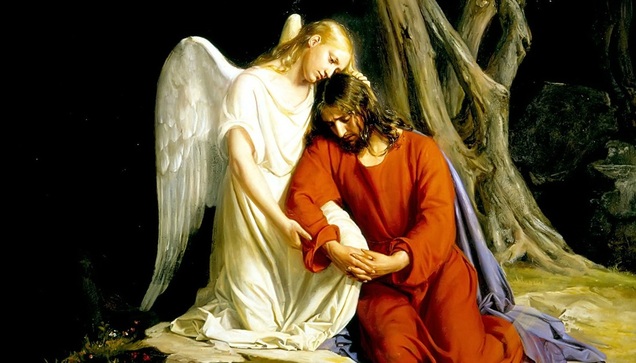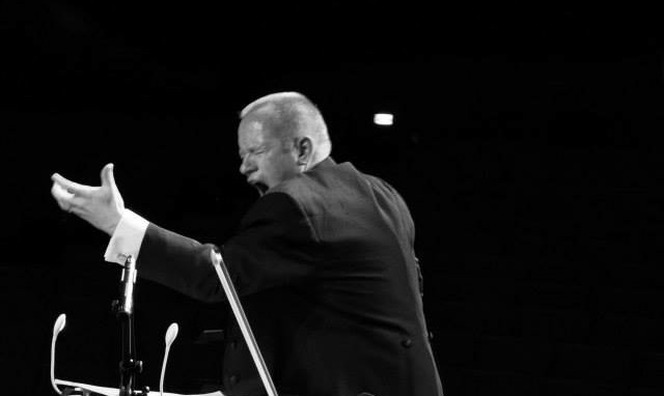|
The last two weeks I have been singing in a production called Lamb of God, by composer Rob Gardner, which portrays the life and mission of Jesus Christ. This is my third year participating in it and it is my new favorite way to celebrate Easter. One of the pieces of this masterful orchestration is entitled "Gethsemane." As I have performed this song, the Spirit has given me a glimpse of the depth of what went on in Gethsemane. A glimpse I have never had, even when I lived in Jerusalem and went to this garden many times a week. Even when I had a very sacred physical experience in Gethsemane, there was no music to make what I felt there come to life. Now there is. There are impressive soloists representing Peter, John, Thomas, Judas, Mary Mother of Jesus, Mary Magdalene, Pilate, and a few others. But the composer chose not to have a soloist represent the Savior. He chose a cello. Here is a low quality video of what this song sounds like without the choir: There is a moment in this song after the cello personifies the expressions of the Savior during the atonement where the choir takes over and starts to sing the words of the Savior as He pleads that the bitter cup be taken from him. A moment when I cannot let myself think about the meaning of what we are portraying, or I lose my composure and with it my ability to perform. It is a sacred, powerful and intense moment. The Abba moment. The orchestra and choir mesh to produce an indelible expression of music that portrays the infinite suffering. Suffering of a God, made human, for this very moment. The music starts in piano (very soft) and grows over about ten measures at which point the orchestra is nearly snapping their strings and the choir is all but screaming. Every time this moment happens, I look at the director who is flexing virtually every muscle in his body as he rips this sound from the collective soul of the choir and orchestra. There isn't a time that I have performed this where I haven't been impressed by the director's excruciating expression, even during rehearsal. It looks as if he is in deep, but necessary pain. After the Abba cry, there is absolute silence. Everyone feels it. It pierces every soul in the audience, choir and orchestra to the center. And though they may not fully comprehend what just happened or the Aramaic words, the central self of each individual knows that what just happened is something of profound significance. Here are the words in the language Jesus would have spoken: ABBA, AVI, EHVAR MANEE KASAH HANAH ------- Father, take away from me this cup ALA LO TSAVANI, ANT TSAVANACH ------- But not my will, Thy will O ABBA! ------- O Father! I know what happened in Gethsemane was real and it was unimaginably difficult. To the point where a God cried out for help from his Daddy. He cried louder than any combined choir and orchestra. He called out to His Abba, and to your Abba. It was a cry of complete desperation because though He was the literal Son of the literal God, there were inklings of mortal humanity within Him and this atonement caused Him to become awestruck. Even amidst this Abba cry and the awful and amazing expiation of the sins of every living soul in the universe, He was the Director. The Director of Gethsemane. At any moment, Jesus of Nazareth could have put the baton down and stopped the awful and infinite music of the wrath of the atonement. He could have chosen not to go through with it. But He didn't. He kept the music going to the bitter end. "---how sore you know not, how exquisite you know not, yea, how hard to bear you know not. For behold, I God, have suffered these things for all, that they might not suffer if they would repent;...which suffering caused myself, even God, the greatest of all, to tremble because of pain, and to bleed at every pore, and to suffer both body and spirit---and would that I might not drink the bitter cup and shrink---" (D&C 19:15-19). Glory be to the Father and thanks be to God that He partook and finished His preparations to all of us. I know that He is, like He said, "the greatest of all". How grateful I am that Jesus is the Christ, the certainty of my uncertainty, the completion of my incompletion, the finisher of my faith, the Director of Gethsemane.
2 Comments
Terri Culmone
3/19/2015 11:52:22 am
THE most beautiful testimony I have ever read! Being a singer in the choir for my 4th year, I have always felt it but could never put it into words as you have. It's exactly my feelings. Those deep down feelings that I could never put into these wonderful words as you have. Absolutely breathtaking!
Reply
Linary Kingdon
3/22/2015 10:11:50 pm
Very nice description and intense experience listening to the music. Thank you for sharing.
Reply
Your comment will be posted after it is approved.
Leave a Reply. |
Archives
March 2021
Categories
All
my old blog |


 RSS Feed
RSS Feed
